中考英语专题复习一般过去时课件19张
图片预览
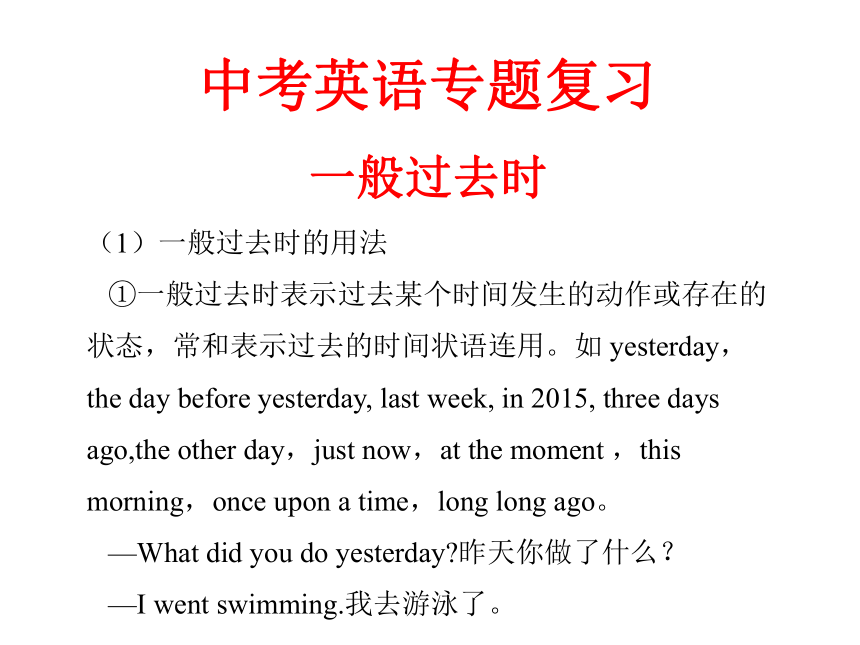
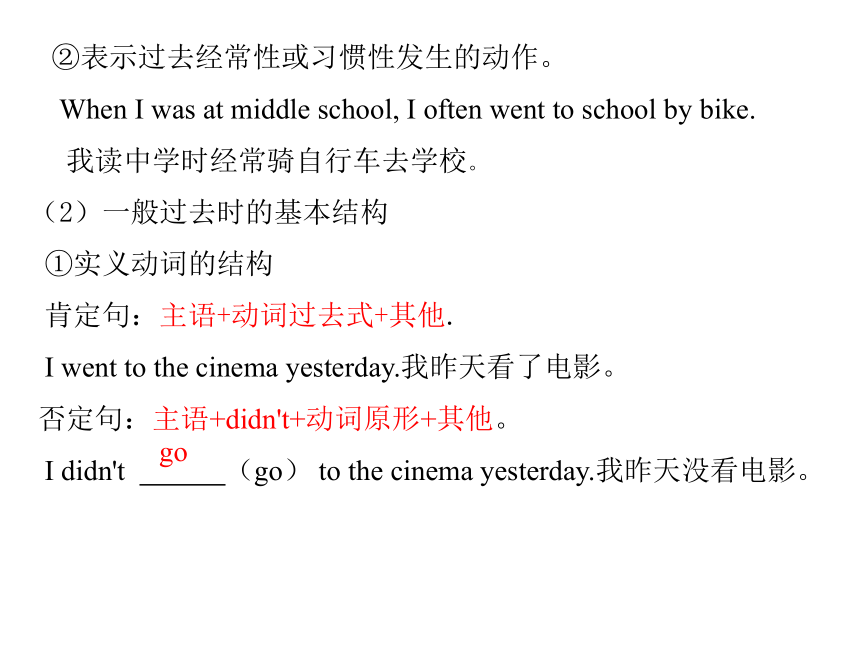
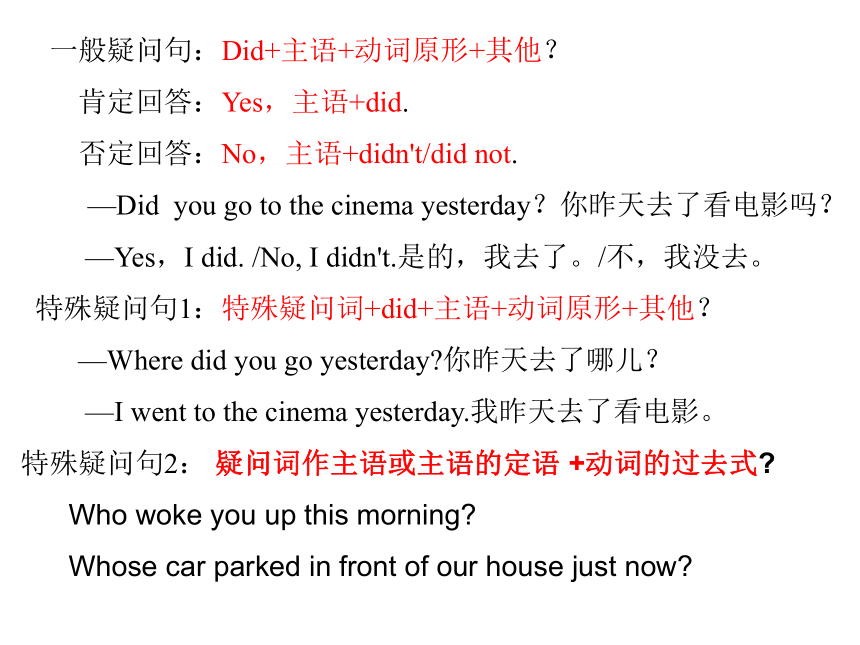
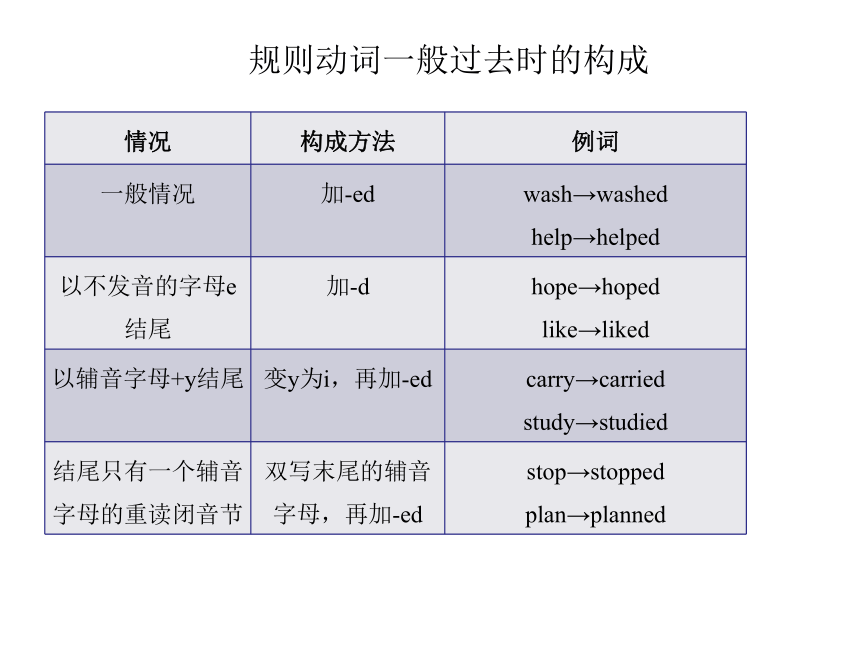
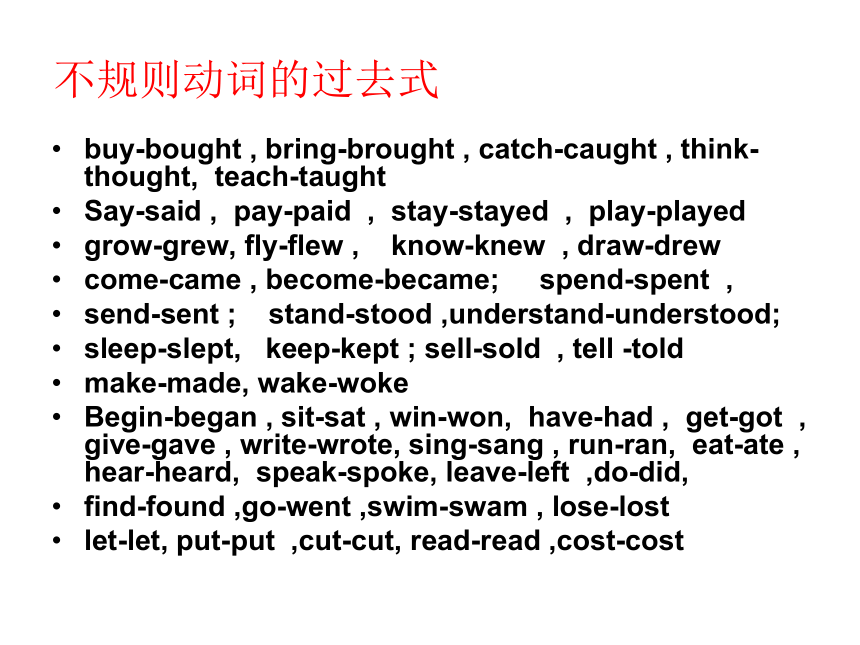
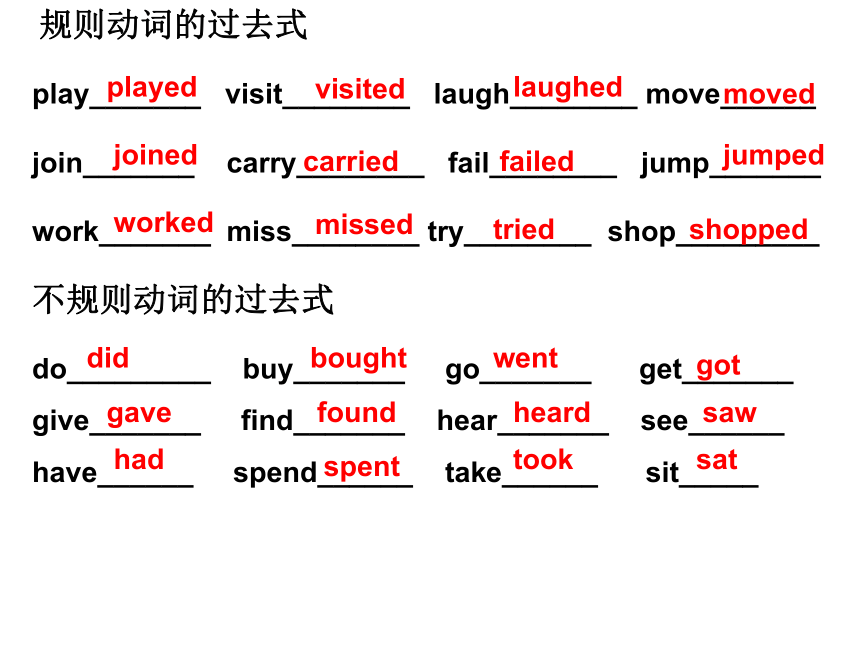
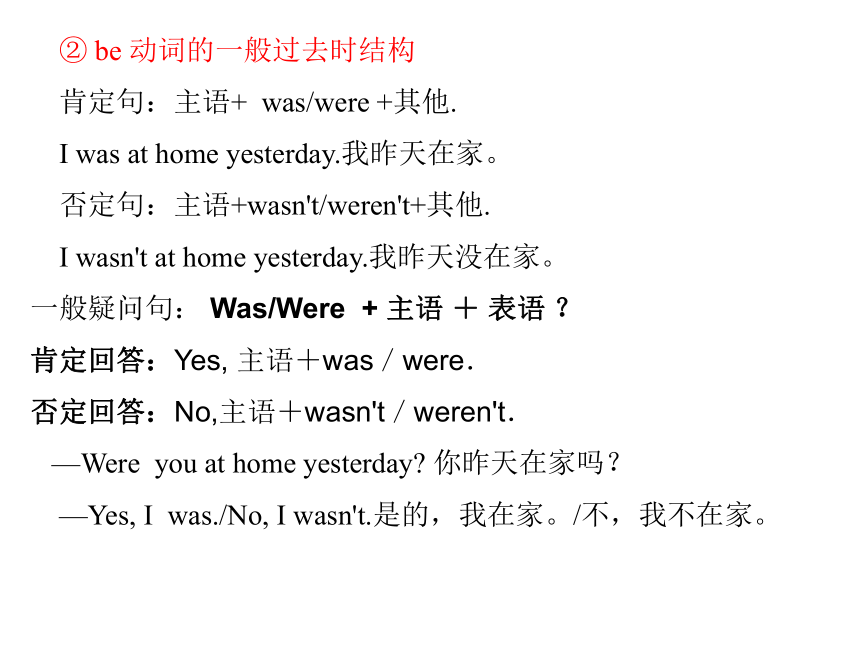
文档简介
(共19张PPT)
中考英语专题复习
一般过去时
(1)一般过去时的用法
①一般过去时表示过去某个时间发生的动作或存在的状态,常和表示过去的时间状语连用。如 yesterday,the day before yesterday, last week, in 2015, three days ago,the other day,just now,at the moment ,this morning,once upon a time,long long ago。
—What did you do yesterday 昨天你做了什么?
—I went swimming.我去游泳了。
②表示过去经常性或习惯性发生的动作。
When I was at middle school, I often went to school by bike.
我读中学时经常骑自行车去学校。
(2)一般过去时的基本结构
①实义动词的结构
肯定句:主语+动词过去式+其他.
I went to the cinema yesterday.我昨天看了电影。
否定句:主语+didn't+动词原形+其他。
I didn't (go) to the cinema yesterday.我昨天没看电影。
go
一般疑问句:Did+主语+动词原形+其他?
肯定回答:Yes,主语+did.
否定回答:No,主语+didn't/did not.
—Did you go to the cinema yesterday?你昨天去了看电影吗?
—Yes,I did. /No, I didn't.是的,我去了。/不,我没去。
特殊疑问句1:特殊疑问词+did+主语+动词原形+其他?
—Where did you go yesterday 你昨天去了哪儿?
—I went to the cinema yesterday.我昨天去了看电影。
特殊疑问句2: 疑问词作主语或主语的定语 +动词的过去式
Who woke you up this morning
Whose car parked in front of our house just now
情况 构成方法 例词
一般情况 加-ed wash→washed help→helped
以不发音的字母e结尾 加-d hope→hoped
like→liked
以辅音字母+y结尾 变y为i,再加-ed carry→carried study→studied
结尾只有一个辅音字母的重读闭音节 双写末尾的辅音字母,再加-ed stop→stopped plan→planned
规则动词一般过去时的构成
不规则动词的过去式
buy-bought , bring-brought , catch-caught , think-thought, teach-taught
Say-said , pay-paid , stay-stayed , play-played
grow-grew, fly-flew , know-knew , draw-drew
come-came , become-became; spend-spent ,
send-sent ; stand-stood ,understand-understood;
sleep-slept, keep-kept ; sell-sold , tell -told
make-made, wake-woke
Begin-began , sit-sat , win-won, have-had , get-got , give-gave , write-wrote, sing-sang , run-ran, eat-ate , hear-heard, speak-spoke, leave-left ,do-did,
find-found ,go-went ,swim-swam , lose-lost
let-let, put-put ,cut-cut, read-read ,cost-cost
规则动词的过去式
do_________ buy_______ go_______ get_______
give_______ find_______ hear_______ see______
have______ spend______ take______ sit_____
did
bought
went
got
gave
found
heard
saw
had
spent
took
sat
play_______ visit________ laugh________ move______
join_______ carry________ fail________ jump_______
work_______ miss________ try________ shop_________
played
visited
laughed
moved
joined
carried
failed
jumped
worked
missed
tried
shopped
不规则动词的过去式
② be 动词的一般过去时结构
肯定句:主语+ was/were +其他.
I was at home yesterday.我昨天在家。
否定句:主语+wasn't/weren't+其他.
I wasn't at home yesterday.我昨天没在家。
一般疑问句: Was/Were + 主语 + 表语 ?
肯定回答:Yes, 主语+was/were.
否定回答:No,主语+wasn't/weren't.
—Were you at home yesterday 你昨天在家吗?
—Yes, I was./No, I wasn't.是的,我在家。/不,我不在家。
特殊疑问句1:特殊疑问词+were/was+主语+其他?
—Where were you yesterday 你昨天在哪?
—I was at home yesterday.我昨天在家。
特殊疑问句2:疑问词作主语或主语的定语 +was/were +表语
— Who was in the classroom when you came in
— Our teacher and our monitor were in the classroom.
— Which classroom was yours when you were at school
— The one on the second floor was ours.
一般过去时
肯定式 主语 + was / were + 其他. 主语 + 动词的过去式 + 其他.
否定式 was
主语 + not + 其他.
were 主语 + didn’t + 动词原形 + 其他.
一般疑
问句及
回答 Was / Were + 主语 + 其他
(肯) Yes, 主语 + was / were.
(否) No, 主语 + wasn’t /
weren’t. Did + 主语 + 动词
原形 + 其他
(肯) Yes, 主语 + did.
(否) No, 主语 +
didn’t.
1. — _____ you at butcher's, too
— No, I ______.
2. — ____ he absent from school last
week
— Yes, he ____.
3. He ___ not understand English!
4. The English and Maths papers
_______ easy enough for me.
5. ___ you want to see me
Were
wasn't
Was
was
did
weren't
Did
6. One sunny day, Alice ___ by a river
with her sister.
7. She ______ up and ____ a white rabbit
in a coat passing by.
8. It ____ a watch out of its pocket and
______ at the time.
9. Alice ___ not want to let the rabbit get
away, …
10. There _____ doors all around, but
they _____ all locked.
sat
looked
saw
took
looked
did
were
were
11. My uncle _______(give) me a present last year.
12. Each of them _______(be not) good at English last term.
13. He _____(read ) a book at the moment. He ____(buy ) the book last week.
14. The little girl _____(cry) after her mother left.
15. Simon often _____(play) computer games.
16. Jim ______(catch) a cold yesterday.
17.There ______(be) some old houses near the river three years ago.
18. ____they ____(enjoy) themselves in the park yesterday
gave
wasn’t
is reading
bought
cried
plays
caught
were
Did
enjoy
Last Sunday , we ______(take) the bus to the sports centre.
We ________(play) badminton in the morning. At noon, we _______(go) to a western restaurant.
We ______(have) lunch there. We ______(eat) a big pizza. In the afternoon, we ________(visit) a local theatre. We _______(like) Beijing opera very much. I ________(buy) lots of souvenirs there. I _________(carry) them home. In the evening, we _____(do) some shopping in a big shopping mall. We all _______(enjoy) ourselves.
played
took
went
ate
had
visited
liked
bought
carried
did
enjoyed
句型转换
1.He did some homework last night.(改为一般疑问句并作肯定回答)
_____ he _____ _____ homework last night
_____, he ______.
2. He was in the room just now.(否定句)
He ______ ______ in the room just now.
3. We visited the museum last Sunday.(提问)
_____ _____ you ______last Sunday
4. I meet him on the way to school every day.(用yesterday 替换 every day)
I ______him on the way to school _______.
5. The man _____(call) Tom is so strange.
______ ______ is so strange.
not
was
did
Yes
any
do
Did
do
did
What
yesterday
met
called
Which man
6. Lucy did her homework at home.
(否定句)
Lucy _______ _____ her homework
at home.
7. He found some meat in the fridge.
(一般疑问句)
______ he _____ ______ meat in the
fridge
didn’t
do
any
find
Did
8. She stayed there for a week.
(划线部分提问)
_____ _____ ____ she _____ there
9. There was some orange juice in the
cup. (一般疑问句)
_____ there _____ orange juice in the
cup
stay
did
long
How
any
Was
翻译句子。
1. 上周末你做什么了?
2. 星期六的早上,我踢足球了。
3. 星期天的晚上,我看电视了。
On Saturday morning, I played soccer.
On Sunday night, I watched TV.
What did you do last weekend
4. 我过了一个忙碌但却有趣的周末。
I had a busy but interesting
weekend.
5. Emma每天都看电视。可是昨天她
没有看。
Emma watches TV everyday, but she
didn’t watch TV yesterday.
6. 今天早上我遇到了林涛。
I met Lin Tao this morning.
7. 他过去抽烟,但现在不抽了。
He smoked in the past, but not now.
8. 她刚才还在这里。
She was here just now.
9. 他什么时候出生的?2000年。
When was he born In 2000.
10. 我在打扫教室的时候,发现地上有
块表。
When I cleaned the classroom, I
found a watch on the floor.
中考英语专题复习
一般过去时
(1)一般过去时的用法
①一般过去时表示过去某个时间发生的动作或存在的状态,常和表示过去的时间状语连用。如 yesterday,the day before yesterday, last week, in 2015, three days ago,the other day,just now,at the moment ,this morning,once upon a time,long long ago。
—What did you do yesterday 昨天你做了什么?
—I went swimming.我去游泳了。
②表示过去经常性或习惯性发生的动作。
When I was at middle school, I often went to school by bike.
我读中学时经常骑自行车去学校。
(2)一般过去时的基本结构
①实义动词的结构
肯定句:主语+动词过去式+其他.
I went to the cinema yesterday.我昨天看了电影。
否定句:主语+didn't+动词原形+其他。
I didn't (go) to the cinema yesterday.我昨天没看电影。
go
一般疑问句:Did+主语+动词原形+其他?
肯定回答:Yes,主语+did.
否定回答:No,主语+didn't/did not.
—Did you go to the cinema yesterday?你昨天去了看电影吗?
—Yes,I did. /No, I didn't.是的,我去了。/不,我没去。
特殊疑问句1:特殊疑问词+did+主语+动词原形+其他?
—Where did you go yesterday 你昨天去了哪儿?
—I went to the cinema yesterday.我昨天去了看电影。
特殊疑问句2: 疑问词作主语或主语的定语 +动词的过去式
Who woke you up this morning
Whose car parked in front of our house just now
情况 构成方法 例词
一般情况 加-ed wash→washed help→helped
以不发音的字母e结尾 加-d hope→hoped
like→liked
以辅音字母+y结尾 变y为i,再加-ed carry→carried study→studied
结尾只有一个辅音字母的重读闭音节 双写末尾的辅音字母,再加-ed stop→stopped plan→planned
规则动词一般过去时的构成
不规则动词的过去式
buy-bought , bring-brought , catch-caught , think-thought, teach-taught
Say-said , pay-paid , stay-stayed , play-played
grow-grew, fly-flew , know-knew , draw-drew
come-came , become-became; spend-spent ,
send-sent ; stand-stood ,understand-understood;
sleep-slept, keep-kept ; sell-sold , tell -told
make-made, wake-woke
Begin-began , sit-sat , win-won, have-had , get-got , give-gave , write-wrote, sing-sang , run-ran, eat-ate , hear-heard, speak-spoke, leave-left ,do-did,
find-found ,go-went ,swim-swam , lose-lost
let-let, put-put ,cut-cut, read-read ,cost-cost
规则动词的过去式
do_________ buy_______ go_______ get_______
give_______ find_______ hear_______ see______
have______ spend______ take______ sit_____
did
bought
went
got
gave
found
heard
saw
had
spent
took
sat
play_______ visit________ laugh________ move______
join_______ carry________ fail________ jump_______
work_______ miss________ try________ shop_________
played
visited
laughed
moved
joined
carried
failed
jumped
worked
missed
tried
shopped
不规则动词的过去式
② be 动词的一般过去时结构
肯定句:主语+ was/were +其他.
I was at home yesterday.我昨天在家。
否定句:主语+wasn't/weren't+其他.
I wasn't at home yesterday.我昨天没在家。
一般疑问句: Was/Were + 主语 + 表语 ?
肯定回答:Yes, 主语+was/were.
否定回答:No,主语+wasn't/weren't.
—Were you at home yesterday 你昨天在家吗?
—Yes, I was./No, I wasn't.是的,我在家。/不,我不在家。
特殊疑问句1:特殊疑问词+were/was+主语+其他?
—Where were you yesterday 你昨天在哪?
—I was at home yesterday.我昨天在家。
特殊疑问句2:疑问词作主语或主语的定语 +was/were +表语
— Who was in the classroom when you came in
— Our teacher and our monitor were in the classroom.
— Which classroom was yours when you were at school
— The one on the second floor was ours.
一般过去时
肯定式 主语 + was / were + 其他. 主语 + 动词的过去式 + 其他.
否定式 was
主语 + not + 其他.
were 主语 + didn’t + 动词原形 + 其他.
一般疑
问句及
回答 Was / Were + 主语 + 其他
(肯) Yes, 主语 + was / were.
(否) No, 主语 + wasn’t /
weren’t. Did + 主语 + 动词
原形 + 其他
(肯) Yes, 主语 + did.
(否) No, 主语 +
didn’t.
1. — _____ you at butcher's, too
— No, I ______.
2. — ____ he absent from school last
week
— Yes, he ____.
3. He ___ not understand English!
4. The English and Maths papers
_______ easy enough for me.
5. ___ you want to see me
Were
wasn't
Was
was
did
weren't
Did
6. One sunny day, Alice ___ by a river
with her sister.
7. She ______ up and ____ a white rabbit
in a coat passing by.
8. It ____ a watch out of its pocket and
______ at the time.
9. Alice ___ not want to let the rabbit get
away, …
10. There _____ doors all around, but
they _____ all locked.
sat
looked
saw
took
looked
did
were
were
11. My uncle _______(give) me a present last year.
12. Each of them _______(be not) good at English last term.
13. He _____(read ) a book at the moment. He ____(buy ) the book last week.
14. The little girl _____(cry) after her mother left.
15. Simon often _____(play) computer games.
16. Jim ______(catch) a cold yesterday.
17.There ______(be) some old houses near the river three years ago.
18. ____they ____(enjoy) themselves in the park yesterday
gave
wasn’t
is reading
bought
cried
plays
caught
were
Did
enjoy
Last Sunday , we ______(take) the bus to the sports centre.
We ________(play) badminton in the morning. At noon, we _______(go) to a western restaurant.
We ______(have) lunch there. We ______(eat) a big pizza. In the afternoon, we ________(visit) a local theatre. We _______(like) Beijing opera very much. I ________(buy) lots of souvenirs there. I _________(carry) them home. In the evening, we _____(do) some shopping in a big shopping mall. We all _______(enjoy) ourselves.
played
took
went
ate
had
visited
liked
bought
carried
did
enjoyed
句型转换
1.He did some homework last night.(改为一般疑问句并作肯定回答)
_____ he _____ _____ homework last night
_____, he ______.
2. He was in the room just now.(否定句)
He ______ ______ in the room just now.
3. We visited the museum last Sunday.(提问)
_____ _____ you ______last Sunday
4. I meet him on the way to school every day.(用yesterday 替换 every day)
I ______him on the way to school _______.
5. The man _____(call) Tom is so strange.
______ ______ is so strange.
not
was
did
Yes
any
do
Did
do
did
What
yesterday
met
called
Which man
6. Lucy did her homework at home.
(否定句)
Lucy _______ _____ her homework
at home.
7. He found some meat in the fridge.
(一般疑问句)
______ he _____ ______ meat in the
fridge
didn’t
do
any
find
Did
8. She stayed there for a week.
(划线部分提问)
_____ _____ ____ she _____ there
9. There was some orange juice in the
cup. (一般疑问句)
_____ there _____ orange juice in the
cup
stay
did
long
How
any
Was
翻译句子。
1. 上周末你做什么了?
2. 星期六的早上,我踢足球了。
3. 星期天的晚上,我看电视了。
On Saturday morning, I played soccer.
On Sunday night, I watched TV.
What did you do last weekend
4. 我过了一个忙碌但却有趣的周末。
I had a busy but interesting
weekend.
5. Emma每天都看电视。可是昨天她
没有看。
Emma watches TV everyday, but she
didn’t watch TV yesterday.
6. 今天早上我遇到了林涛。
I met Lin Tao this morning.
7. 他过去抽烟,但现在不抽了。
He smoked in the past, but not now.
8. 她刚才还在这里。
She was here just now.
9. 他什么时候出生的?2000年。
When was he born In 2000.
10. 我在打扫教室的时候,发现地上有
块表。
When I cleaned the classroom, I
found a watch on the floor.
同课章节目录
- 词法
- 名词
- 动词和动词短语
- 动词语态
- 动词时态
- 助动词和情态动词
- 非谓语动词
- 冠词
- 代词
- 数词和量词
- 形容词副词及其比较等级
- 介词和介词短语
- 连词和感叹词
- 构词法
- 相似、相近词比较
- 句法
- 陈述句
- 一般疑问句和否定疑问句
- 特殊疑问句及选择疑问句
- 反意疑问句
- 存在句(There be句型)
- 宾语从句
- 定语从句
- 状语从句
- 主谓一致问题
- 简单句
- 并列句
- 复合句
- 主谓一致
- 主、表语从句
- 名词性从句
- 直接引语和间接引语
- 虚拟语气
- 感叹句
- 强调句
- 倒装句
- 祈使句
- 句子的成分
- 句子的分类
- 题型专区
- 单项选择部分
- 易错题
- 完形填空
- 阅读理解
- 词汇练习
- 听说训练
- 句型转换
- 补全对话
- 短文改错
- 翻译
- 书面表达
- 任务型阅读
- 语法填空
- 其他资料
